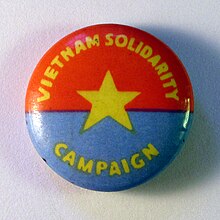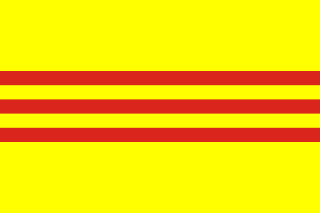
South Vietnam, officially the Republic of Vietnam, was a country in Southeast Asia that existed from 1955 to 1975, the period when the capitalist southern portion of Vietnam was a member of the Western Bloc during part of the Cold War after the 1954 division of Vietnam. It first received international recognition in 1949 as the State of Vietnam within the French Union, with its capital at Saigon, before becoming a republic in 1955. South Vietnam was bordered by North Vietnam to the north, Laos to the northwest, Cambodia to the southwest, and Thailand across the Gulf of Thailand to the southwest. Its sovereignty was recognized by the United States and 87 other nations, though it failed to gain admission into the United Nations as a result of a Soviet veto in 1957. It was succeeded by the Republic of South Vietnam in 1975. In 1976, the Republic of South Vietnam and North Vietnam merged to form the Socialist Republic of Vietnam.

The Viet Cong was an epithet and umbrella term to call the communist-driven armed movement and united front organization in South Vietnam, Laos and Cambodia. Formally organized as and led by the National Liberation Front of South Vietnam, it fought under the direction of North Vietnam against the South Vietnamese and United States governments during the Vietnam War. The organization had both guerrilla and regular army units, as well as a network of cadres who organized and mobilized peasants in the territory the Viet Cong controlled. During the war, communist fighters and some anti-war activists claimed that the Viet Cong was an insurgency indigenous to the South that represented the legitimate rights of people in South Vietnam, while the U.S. and South Vietnamese governments portrayed the group as a tool of North Vietnam. It was later conceded by the modern Vietnamese communist leadership that the movement was actually under the North Vietnamese political and military leadership, aiming to unify Vietnam under a single banner.

The flag of South Vietnam was first introduced by the Provisional Central Government of Vietnam, later served as the national flag of the State of Vietnam, and its successor, the Republic of Vietnam from 1948 to 1975 until the fall of Saigon. The design consists of a yellow background with three red horizontal stripes through the middle. It is used to represent the "Vietnamese Heritage and Freedom Flag".

The Russell Tribunal, also known as the International War Crimes Tribunal, Russell–Sartre Tribunal, or Stockholm Tribunal, was a private People's Tribunal organised in 1966 by Bertrand Russell, British philosopher and Nobel Prize winner, and hosted by French philosopher and writer Jean-Paul Sartre, along with Lelio Basso, Simone de Beauvoir, Vladimir Dedijer, Ralph Schoenman, Isaac Deutscher, Günther Anders and several others. The tribunal investigated and evaluated American foreign policy and military intervention in Vietnam.

The Chicano Moratorium, formally known as the National Chicano Moratorium Committee Against The Vietnam War, was a movement of Chicano anti-war activists that built a broad-based coalition of Mexican-American groups to organize opposition to the Vietnam War. Led by activists from local colleges and members of the Brown Berets, a group with roots in the high school student movement that staged walkouts in 1968, the coalition peaked with a August 29, 1970 march in East Los Angeles that drew 30,000 demonstrators. The march was described by scholar Lorena Oropeza as "one of the largest assemblages of Mexican Americans ever." It was the largest anti-war action taken by any single ethnic group in the USA. It was second in size only to the massive U.S. immigration reform protests of 2006.

Opposition to United States involvement in the Vietnam War began with demonstrations in 1965 against the escalating role of the United States in the Vietnam War and grew into a broad social movement over the ensuing several years. This movement informed and helped shape the vigorous and polarizing debate, primarily in the United States, during the second half of the 1960s and early 1970s on how to end the Vietnam War.

Ernie Tate was a long-standing supporter and leading member of Trotskyist groups in Canada and the United Kingdom and a founder in the 1960s of the International Marxist Group and Vietnam Solidarity Campaign in Britain.

The protests of 1968 comprised a worldwide escalation of social conflicts, which were predominantly characterized by the rise of left-wing politics, anti-war sentiment, civil rights urgency, youth counterculture within the silent and baby boomer generations, and popular rebellions against state militaries and bureaucracies.
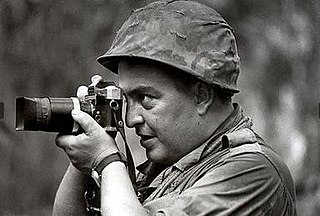
Horst Faas was a German photo-journalist and two-time Pulitzer Prize winner. He is best known for his images of the Vietnam War.
The Vietnam Day Committee (VDC) was a coalition of left-wing political groups, student groups, labour organizations, and pacifist religions in the United States of America that opposed the Vietnam War during the counterculture era. It was formed in Berkeley, California in the spring of 1965 by activist Jerry Rubin, and was active through the majority of the Vietnam war, organizing several rallies and marches in California as well as coordinating and sponsoring nationwide protests.

Cambodia–Vietnam relations take place in the form of bilateral relations between the Kingdom of Cambodia and the Socialist Republic of Vietnam. The countries have shared a land border for the last 1,000 years and share more recent historical links through being part of the French colonial empire. Both countries are members of the Association of Southeast Asian Nations (ASEAN).
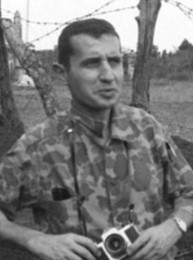
François Sully (1927–1971) was a French journalist and photographer best known for his work during the Vietnam War. Sully was one of the earliest journalists to cover the Vietnam War and spent 24 years in Indochina. At the time of his death in a command helicopter crash near the Cambodian border, he was viewed as the dean of the Saigon press corps.

North Vietnam, officially the Democratic Republic of Vietnam, was a socialist state in Southeast Asia that existed from 1945 to 1976, with formal sovereignty being fully recognized in 1954. A member of the Eastern Bloc, it opposed the French-supported State of Vietnam and later the Western-allied Republic of Vietnam. North Vietnam emerged victorious over South Vietnam in 1975 and ceased to exist the following year when it unified with the south to become the current Socialist Republic of Vietnam.

An anti-war movement is a social movement, usually in opposition to a particular nation's decision to start or carry on an armed conflict. The term anti-war can also refer to pacifism, which is the opposition to all use of military force during conflicts, or to anti-war books, paintings, and other works of art. Some activists distinguish between anti-war movements and peace movements. Anti-war activists work through protest and other grassroots means to attempt to pressure a government to put an end to a particular war or conflict or to prevent it in advance.
An-My Lê is a Vietnamese American photographer, filmmaker, author and professor at Bard College.
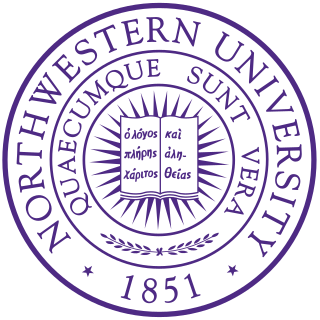
Similar to many undergraduate campuses across the United States, Northwestern University has had multiple student protests, some contemporary, but most are concentrated in the 1960s and early 1970s. Subjects of protests include anti-war sentiments, black student relations, and more.

The native inhabitants of the Central Highlands of Vietnam are known as the Montagnard. The Vietnamese conquered the Central Highlands during their "march to the south". Ethnic Vietnamese (Kinh) people now outnumber the indigenous Degars after state-sponsored colonization directed by both the government of South Vietnam and the current Communist government of unified Vietnam. The Montagnards have engaged in conflicts with the Vietnamese, from the anti-Communist South Vietnamese government, the Viet Cong, to the Communist government of unified Vietnam. There are contrasting views on this issue, as the constitution of the government of Vietnam states "Article 36 of the Constitution, the state invests heavily in education and supports various preferential programmes for ethnic minorities, like ethnic minority boarding schools, lower entry requirements and quota for minorities." Both the initial 1945 constitution and the revised 1992 constitution of North Vietnam and the successor state the Socialist Republic of Vietnam stated that all minority groups in Vietnam have the right to maintain their mother tongues in their schooling as well as to use their languages to preserve their ethnic cultures and values, although the degree of enforcement remains ongoingly debated due to complicated nature.
The tradition of photography started in the 19th century in Vietnam and has since then given rise to modern photography and photojournalism into the 20th century.
